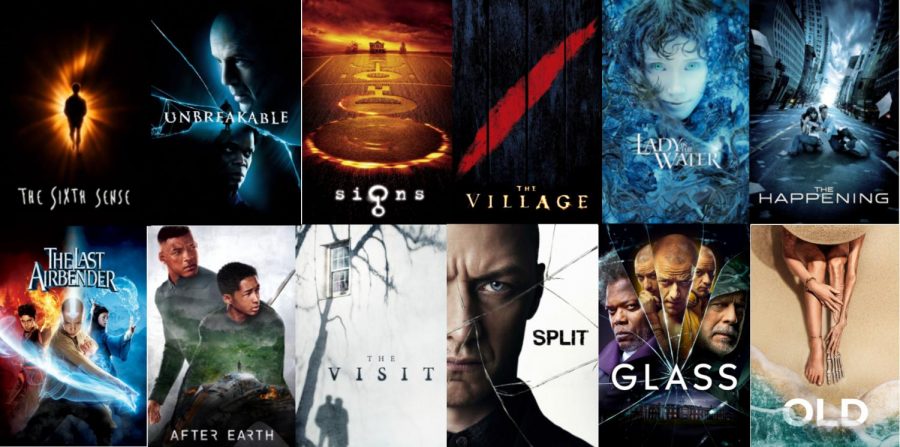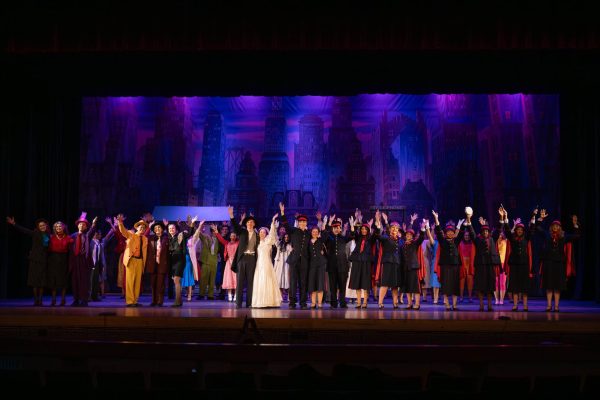The films of M. Night Shyamalan ranked
From “The Sixth Sense” to “Old,” M. Night Shyamalan’s career spans 14 films and almost three decades.
M. Night Shyamalan has always stood out as a filmmaker known for his continuous idiosyncrasy, but he’s also one of the most divisive. For each viewer who champions his visionary storytelling and kindhearted nature, there’s another who pans the stilted dialogue and acting that’s prevalent in nearly all of his work, and seemingly everybody has a different favorite of his films. I had been an outsider to his work, but with “Old” premiering late this summer, I felt an urge to finally delve into his films and see whether or not I would be in the camp that loves him or hates him. (Spoiler alert: he’s now one of my favorite filmmakers.)
#14: The Last Airbender (2011)
Overall rating: 35/100
Granted, I’ve only seen one, maybe two episodes of the original series that this is based off of, so maybe I’m not exactly qualified to talk about this, but I still recognize that “The Last Airbender” is a bad adaptation. Trying to cram a whole season of a television show into less than 100 minutes is an inherently flawed idea, and it’s clear that there’s a lot missing: the mythology is barely explained, the characters’ personalities and arcs are all cut or condensed and both of those things are summarized through a near constant stream of exposition and narration that goes at a rushed pace which gets old very quickly. But this is still an M. Night Shyamalan film, so it at least has some great design aspects, action and a rousing score from composer James Newton Howard. At the end of the day, this is definitely his worst film, but I fail to see how this is considered one of the worst films ever made.
#13: Wide Awake (1998)
Overall rating: 57/100
“Wide Awake” is a relatively unknown film from Shyamalan, as it was his second film made before “The Sixth Sense” launched him to worldwide renown. The film follows ten year old Joshua on his quest to find God after his grandfather dies, as well as overcoming all of the other hurdles that are a part of coming of age. This film definitely had potential as a story about a crisis of faith, and while I could recall my experiences at my religious education class and relate to a lot of those aspects, this is just bland. For a film that’s not even 90 minutes long, I felt the urge to watch this at 1.25x speed a lot more than I should have. None of Shyamalan’s style is present here (although that’s because of the Weinsteins being tortuous producers, which is a story for another time.) It’s not bad—on the contrary, I thought a lot of the film was cute and pretty funny overall—it’s just never great.
#12: Praying with Anger (1992)
Overall rating: 63/100
It’s a little weird that Shyamalan kicked off his career with two films that couldn’t be further thematically from his thrillers, but “Praying with Anger” is a mighty impressive debut feature. It follows teenager Dev—played by Shyamalan himself in the only starring role of his career—who, at the request of his mother, leaves his American home to go to India for a year in the college exchange program. When he gets there, he gets culture shock as he is forced to adapt to a society that’s radically different from everything that he knows. For a first film, this is indeed remarkable, but when looked at as just a film, it’s just mediocre; the narrative is nothing more than a standard melodrama. It does have a sort of amateurish charm to it, but there are a few factors that do hinder it. One, I’m not Indian, so the themes that Shyamalan discusses here about social class only vaguely engage me. Two, this film is seemingly only available in one of the lowest quality uploads I’ve ever seen—which especially hurts since the cinematography is pretty amazing. It’s interesting to see where Shyamalan got started, but I’d only recommend this for diehard Shyamalan fans that would also find that interesting. Just please, somebody, anybody give this a quality restoration.
#11: Lady in the Water (2006)
Overall rating: 68/100
If I’m being fully honest, I still don’t really know what “Lady in the Water” is about. Bryce Dallas Howard is a magical pale water spirit thing that has to get back home with the help of a fairytale and a stuttering Paul Giamatti, but there’s these wolves made of grass trying to stop her. It’s a messy film, but also one that’s deeply idiosyncratic, ambitious and empathetic, which is a recurring motif with Shyamalan’s films. As a director, he tends to prioritize intuition and emotion over things like logic and reason, and it’s never been more evident than here. Many people say that this is where he truly became a bad filmmaker, but I think I’d rather have films that are as out of the box as this than, say, another Marvel film. The one coherent idea that I do have about this film is that the characters that populate the film’s setting, an apartment complex called The Cove, tend to feel more like physical manifestations of Shyamalan’s many, many ideas rather than actual people. Those ideas are all still interesting enough to have the film linger in my mind, though, and I can picture this growing on me in the future.
#10: After Earth (2013)
Overall rating: 70/100
Similar to “The Last Airbender,” “After Earth” is a film that is inexplicably considered by some to be one of the worst films ever made, to which I’ll say this: this could’ve been made by any other director and it would be held to the same standard as any other forgettable action film. I do believe that there is some weird deep-rooted bias that a lot of people have towards Shyamalan because the film really isn’t that bad. The story is nothing special—it’s just Jaden Smith going from point A to point B and learning to overcome fear—but the main draw for this film is its visuals. It’s a showcase of the capabilities of modern VFX that’s immersive and breathtaking. Jaden and Will Smith’s performances have both been generally bashed by critics and audiences alike, but for the characters they’re playing, I don’t think they did a bad job of selling the emotional beats. This is the only film of his career where my reaction is a resounding “it’s alright,” but I’ll take that.
#9: Split (2016)
Overall rating: 81/100
There’s a discussion to be had about this film’s portrayal of dissociative identity disorder, but “Split” is more concerned with the effects of trauma, and as a portrayal of that, it’s great. Of course, to talk about this film is to talk about the man at its core, James McAvoy. Watching him shapeshift into multiple personalities throughout the film, sometimes all in one scene, is entrancing, and many of the film’s issues are trounced by his gripping performance—but don’t think that Anya Taylor-Joy doesn’t shine (per usual) in her role either. There’s a lot of expository scenes in the film that threaten to go on for too long, but whenever Shyamalan focuses on our heroine and is beautifully navigating the camera through the seemingly endless hallways she’s trapped in, it’s thrilling. And don’t even get me started on that ending; I almost fell out of my chair.
#8: The Happening (2008)
Overall rating: 83/100
I feel like I should preface this placement in the ranking, since I know that this film has become a meme of sorts because of how bad it supposedly is, but I wholly enjoyed it all. It’s easy to look at scenes like Mark Wahlberg talking to a plastic plant and write it off as trash, but this is so much more than just a tacky film. Shyamalan, as always, shows some real craftsmanship in some of the images he conjures—a shot of bodies falling from a construction site and a long take of a chain of people committing suicide with the same gun are specifically haunting—and as a film about the hysteria of the post-9/11 landscape, it’s honestly terrific. The characters have no clue what is attacking them or how to/if they can escape it, and rationality slowly becomes obsolete; they might as well run away from the wind. Of course, that’s just my take on it. “The Happening” is ultimately a mystery unlike any other, a film so weird and impenetrable that it seems like we’ll never find out what it is or what it’s trying to be, but I love it anyways.
#7: The Visit (2015)
Overall rating: 84/100
Many people said that “The Visit” was a return to form for Shyamalan, and even though he never really left, this is an impressive film indeed. If there’s any modern filmmaker capable of taking something as stale as the found footage horror genre and breathing life into it, it’s him. In many ways, this is his simplest and most traditional film, but it’s also his scariest, his funniest and one of his most emotionally investing efforts. It’s a rather unwieldy combination of tones and genres, and while the tonal shifts are blatant, they’re all strung together by Shyamalan’s peerless style. It also helps that the film only has around five characters that are all sustained by amazing performances, and by the time the film reaches its masterful climax, the somewhat foreseeable plot twist is nullified. “The Visit” is just a good, fun time.
#6: Glass (2019)
Overall rating: 88/100
The natural conclusion to the surprise trilogy consisting of “Unbreakable” and “Split,” “Glass” takes all of the greatest aspects of those two films and amplifies them to great effect. It takes a while to get the ball rolling, as Shyamalan spends a fair amount of the runtime rehashing the themes and questions that the previous two films enunciated, which even then he still does in an exceptional manner. But once Willis, Jackson and McAvoy’s characters all finally share the screen, it flourishes both as a conventional action-thriller and an immensely touching showcase of Shyamalan’s undying compassion. Anya Taylor-Joy and Spencer Treat Clark reprising their roles and the introduction of Sarah Paulson’s character round out an equally incredible supporting cast, and Mike Gioulakis of “It Follows” returning as cinematographer makes every shot look lovely. It’s as fitting of a conclusion as you could get to a loose trilogy defined by identity and trauma.
#5: Old (2021)
Overall rating: 89/100
The concept at the center of this film is about as oddball as any of Shyamalan’s concepts get: the beach makes you old. Why does the beach make you old? Beats me—the best theory that any of the characters in the film come up with is that it has to do with the massive rocks surrounding it. But again, Shyamalan’s films don’t need logic to be effective. A lot of people have written this off by saying “ThE bEaCh MaKeS yOu OlD?!?! tHiS iS sO wEiRd RiGhT gUyS,” but there’s a lot more going on behind the surface of “Old.” It’s a film overflowing with overwhelming ideas about the inescapable horror of ageing and the inevitability of death and loss. I’d say that it’s tied with “The Visit” for being his scariest film, and while how it utilizes its premise is already alarming enough, there’s one petrifying moment in particular that evokes body horror and another mere moments later that had me on the verge of tears considering the emotional weight that some of the events carry. It’s capital-b-Bold filmmaking, and unmistakably a film from Shyamalan. Some people will see that as a bad thing, but it’s refreshing to see that something so daring can still be made.
#4: Unbreakable (2000)
Overall rating: 91/100
Hot off the heels of “The Sixth Sense,” Shyamalan delivered one of the greatest superhero films ever made. What makes “Unbreakable” such an amazing film is the fact that it was made two years before Sam Raimi’s “Spider-Man” films and almost a whole decade before “Iron Man” kickstarted the Marvel Cinematic Universe. It almost feels like a premonition, a warning to how the future of comic book films would largely neglect the mental damage that comes with being superhuman. Of course, it’s also just a really well made and absorbing film, with Bruce Willis perfectly selling the muted nature of his character and Samuel L. Jackson doing the same for his enigmatic persona. It lacks the sharp pacing of “The Sixth Sense,” especially as it approaches its ending, but Shyamalan never fails to construct an effective plot twist, and here is most definitely no exception. “Unbreakable” is slick filmmaking, a pitch perfect blend of psychological thriller and blockbuster action, and I’ll be happy when it finally is discussed as a major comic book film.
#3: Signs (2002)
Overall rating: 93/100
There’s a line that Mel Gibson says in this film that I think is perfectly applicable to how I feel about people who say they hate Shyamalan: “Everybody in this family needs to just calm down and eat some fruit or something.” That line is hilarious out of context, but in the context of a man going through a crisis of faith while also facing a global crisis that he has to protect his family from, “Signs” is haunting, wondrous and just plain astonishing. This might be Shyamalan’s most confidently directed film; every aspect is so fine tuned that it’s hard to do anything other than sit there and let your jaw hit the floor. It’s also, as is par for the course with his work, as overwhelmingly earnest as it is gripping and creepy—for example, when protagonist Graham Hess sentimentally monologues to his son about his birth while aliens are about to break into their house, it should be gawky, but it’s just perfect. Mel Gibson, Joaquin Phoenix, Rory Culkin and Abigail Breslin are up there for the greatest leading ensemble of any of the films on this list; every single moment of hysteria and fear hits as hard as it does because of how impeccable their performances are. The only possible issue I can think of is that the first act could be a little more exciting, but the second the crop circles are revealed, “Signs” fires on all cylinders.
#2: The Sixth Sense (1999)
Overall rating: 96/100
If we’re being technical, “The Sixth Sense” can be considered a thriller or a horror film, but Shyamalan’s breakthrough feature lays the groundwork for the empathy that courses through the veins of his films, and beautifully so. For each ghastly vision seen through the eyes of young Cole, there’s a moment that’s just as moving. Frankly, I don’t have much to say about this film—it got placed on the AFI’s “100 Years… 100 Movies” poll in 2007, which made it the most recent film to be given such an honor, which I think says something about how much of a phenomenon it has become. How Shyamalan generates tension through simple pacing and the audience’s expectations of editing is riveting, and Haley Joel Osment gives one of the greatest child performances ever while also being surrounded by the equally brilliant Bruce Willis and Toni Colette. This is nothing that you haven’t already heard, and for good reason; “The Sixth Sense” is extraordinary.
#1: The Village (2004)
Overall rating: MASTERPIECE
This is the part of this review that I’ve been dreading because I have no clue how to put my love for this film into words. The best (and only) way I can describe “The Village” is that it’s absolutely ravishing. James Newton Howard’s score, Roger Deakin’s consistently top-notch cinematography and Tom Foden’s production design all add up to an experience that’s impeccable, symphonic and luscious, and that’s without getting to the romance at its core. It’s deftly replete with glances, embraces and gestures that had me enamored. The bitter reception that the twist ending has received is greatly ironic, as this is probably the quintessential post-9/11 film—how anybody watched this in 2004 and thought that its depiction of a community rejecting the realities of tragedy and affliction in favor of a “greater good” was silly is just hilarious. If anything, watch “The Village” solely for what’s undoubtedly the greatest scene out of Shyamalan’s whole career—a hand blindly outstretched into darkness in the face of danger, knowing that the world will move for love and kneel before it in awe.
Whether you love M. Night Shyamalan’s films or hate them, you have to at least admire the man, as I don’t think there has been or will ever be a filmmaker that’s as brazen as him. It’s often disheartening to see how many people tear him apart on the internet when nearly all of his films are so kindhearted, but as long as he’s still putting out films, it’ll be good to know that there are at least some people in the world that can appreciate creativity.
Average rating: 79/100
Your donation will support the student journalists of Neuqua Valley High School. Your contribution will allow us to print our next newspaper edition as well as help us purchase equipment and cover our annual website hosting costs.







